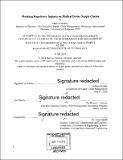Modeling regulatory impacts on medical device supply chains
Author(s)
Medina, Melissa (Melissa M.)
DownloadFull printable version (3.477Mb)
Other Contributors
Massachusetts Institute of Technology. Supply Chain Management Program.
Advisor
Bruce C. Arntzen.
Terms of use
Metadata
Show full item recordAbstract
Changing regulatory requirements continues to be an increasingly complex issue in the medical device industry. Regulations place stress on regional supply chains across the world. Most recently, the European Parliament issued the Medical Device Regulation (EU) 2017/745 instituting new compliance framework for all devices manufactured, sold, and/or distributed in the European Union. The new framework requires the implementation of unique device identifiers and more stringent conformity assessment procedures. In addition, many device classification types have changed, post-market clinical surveillance has been instituted, and traceability through a centralized IT database is now mandated. While the the act aims to improve patient safety and efficacy across the medical device industry, it poses huge impacts across both the physical and informational flows in supply chains. This research evaluates the regulatory impact across supply chain operations using predictive modeling and machine learning. The model determines how various activities and events in manufacturing and sourcing environments contribute to supply constraints when modified to accommodate new regulatory requirements. The model also determines how product attributes contribute to performance variability. By taking a proactive approach to assess the impacts of regulatory changes, firms can optimize supply chain flows to reduce cost, lead-time, and service level risks.
Description
Thesis: M. Eng. in Supply Chain Management, Massachusetts Institute of Technology, Supply Chain Management Program, 2018. Cataloged from PDF version of thesis. Includes bibliographical references (page 27).
Date issued
2018Department
Massachusetts Institute of Technology. Supply Chain Management ProgramPublisher
Massachusetts Institute of Technology
Keywords
Supply Chain Management Program.